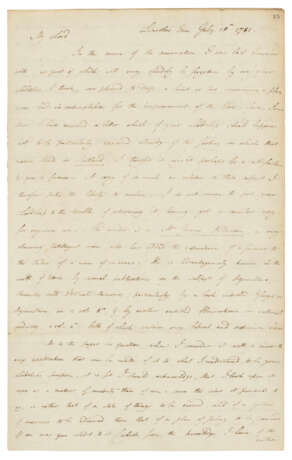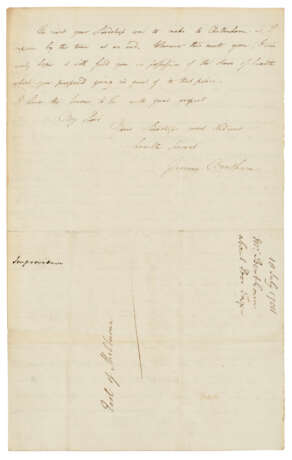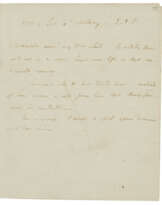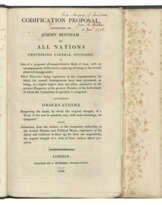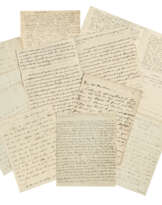ID 1109075
Лот 275 | Jeremy Bentham (1748-1832)
Оценочная стоимость
£ 5 000 – 8 000
Autograph letter signed (‘Jeremy Bentham’) to [William Petty], Earl Shelburne [later 1st Marquess of Lansdowne] (‘My Lord’), Lincoln’s Inn, 19 July 1781
Four pages, 324 x 201mm, bifolium, docketed in another hand, Shelburne pagination. Provenance: Marquesses of Lansdowne; their sale, Christie’s, Bowood House sale, 12 October 1994, lot 2.
On the improvement of the Poor Laws, in which England falls short of Scotland, and his first meeting with the Earl of Shelburne, the man who would become his great friend and patron. During their last conversation 'your Lordship, I think, was pleased to drop a hint or two concerning a plan you had in contemplation for the improvement of the Poor Laws', enclosing a copy of letter [not present] written by a James Anderson, an author of 'liberal and extensive views', which will appraise him of the footing of that matter in Scotland. The paper serves 'more as a matter of curiosity than of use' as it presents the situation in Scotland as worthy of emulation without offering any plan of action, but Bentham offers his understanding of the three elements 'upon which the perfection of the Scottish management of this business turns [...] humanity, frugality and honest pride: the first on the part of the contributors, the second on the part of the managers, that and the last together on the part of the receivers'. He thinks England equal in respect of the first quality: 'But in both the other points we have been hitherto, and perhaps ever shall be, far behind them', drawing a distinction between countries led by laws or manners: 'Accordingly, with them the business is done by manners only, and as far as taxes are concerned for nothing: with us, by a most complicated system of laws and an immense experience', explaining that he has organised Anderson's paper a little before passing it on ('The marginal-contenting (that your Lordship may not be startled by it) is a sort of hobby-horse exercise of mine, which the weakness of my frame forces me to be practising upon all occasions [...] so that without it I can never fancy myself master of any thing I either write or read'). Since his visit to Shelburne House, he has been studying more closely constitutional law [for a chapter in the Introduction to the Principles]; his approach has been 'first to consider what is possible, next what is eligible and lastly what is established', the first being most relevant to his work.
Bentham's close association with William Petty, 2nd Earl Shelburne began in July 1781 when Shelburne visited him at his chambers in Lincoln's Inn. Shelburne borrowed a copy of A Fragment on Government and invited Bentham to spend part of the summer at Bowood, his country house. After some hesitation – for Bentham thought he ought first to establish his reputation amongst England’s political and intellectual elite by bringing out his Introduction to the Principles of Morals and Legislation – he visited Bowood and established a relationship with Shelburne which lasted for many years. During their first meeting in 1781 – the year before Shelburne became Prime Minister – Bentham gave Shelburne some explanation of the work on which he was engaged, but when he came to write this letter, he was in some doubt as to how far he should enlarge upon the subject and eventually decided to discard lengthy passages of explanation across the four drafts of this letter that exist. James Anderson of Hermiston (1739-1808), farmer, journalist and author, was a prominent figure in the Scottish Enlightenment and invented the Scotch plough.
| Автор: | Иеремия Бентам (1748 - 1832) |
|---|---|
| Место происхождения: | Англия |
| Автор: | Иеремия Бентам (1748 - 1832) |
|---|---|
| Место происхождения: | Англия |
| Адрес торгов |
CHRISTIE'S 8 King Street, St. James's SW1Y 6QT London Великобритания | |||||
|---|---|---|---|---|---|---|
| Предосмотр |
| |||||
| Телефон | +44 (0)20 7839 9060 | |||||
| Комиссия | see on Website | |||||
| Условия использования | Условия использования |
